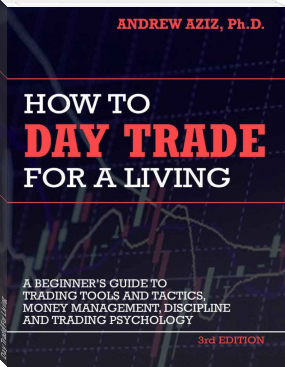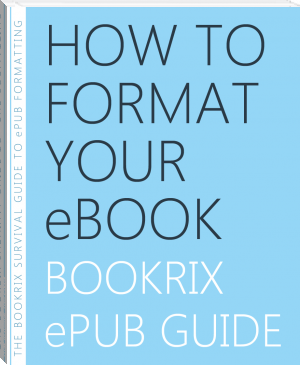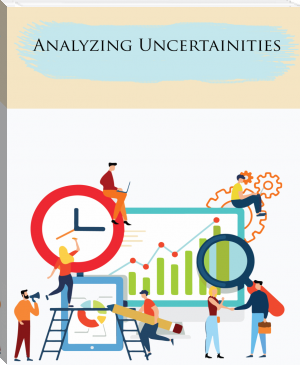Day Trade For Living, Andrew Aziz [bill gates books to read .txt] 📗

- Author: Andrew Aziz
Book online «Day Trade For Living, Andrew Aziz [bill gates books to read .txt] 📗». Author Andrew Aziz
Why is this process in trading important? This process is important because it describes how things are done to prepare for a trade and then
provides the focus for executing them. It helps to filter out the emotional social noise and gives you a better chance for a more successful winning trade. It provides you with a tool to go back to and reflect on your trades and makes you a better trader. If you focus on the right processes, in the right way, you can design your way to trading success.
Chapter 9:Next Steps for Beginner Traders
Successful day trading is based on three important skills.
You need to analyze the balance of power between buyers and sellers and bet on the winning group (Chapter 6).
You need to practice excellent money and trade management (Chapter 3).
And you need sufficient self-discipline to follow your trading plan, to avoid getting overexcited or depressed in the markets, and to resist the temptation to make emotional decisions.
Now that you have read this book, you should be in a better position to make a decision on whether or not day trading is right for you. Day trading requires a certain mindset, as well as a discipline and a set of skills that not everyone possesses. Interestingly, most of the traders I know are also poker players. They enjoy speculation and the stimulation that comes from it. Although poker is a type of gambling, day trading is not. Day trading is a science, a skill, and a career, and has nothing to do with gambling. It is the serious business of selling and buying stocks, sometimes in a matter of seconds. You should be able to make decisions fast, with no emotion or hesitation. Doing otherwise results in losing real money.
After you've made up your mind and decided that you want to start day trading, the next step is to get a proper education. You should never start your day trading career with real money. Sign up with one of the brokers that provides you with simulated accounts with real market data. Some brokers give you access to delayed market data, but don't use those. You need to make decisions real time. Most of the simulated data software is a paid service, so you need to save some money for that software. DAS Trader (www.dastrader .com) offers simulated accounts for $120 per month. If you use it for one year and trade only with simulated money, it will cost you only $1,440. This is the cost of a proper education . If you are seriously considering day trading as a career, it's a small expenditure compared to the cost of an education for a new profession. For exam ple,
imagine that you want to go to school to get an MBA - it will easily cost you over $50,000. Likewise, many other diploma or post-graduation programs cost significantly more than the education required for day trading.
Once you have a simulated account, you will need to develop your strategy. Try the strategies that I have discussed in this book, and master one or two of them. VWAP, Support or Resistance, and Reversal Strategies are the easiest. You need to only master a few of them to always be profitable in the market. Keep your strategy simple. When you have a solid strategy that you've mastered, make sure there is no emotion attached to it.
Practice with the amounts of money that you will be trading in real life. It is easy to buy a position worth $100,000 in a simulated account and watch it lose half of its value in a matter of seconds. But could you tolerate this loss in a real account? If not, you will probably become an emotional trader and make a decision quickly, usually resulting in a major loss . Always trade with the size and position that you will be using in the real account. Otherwise, there is no point in trading in a simulated account. Move to a real account after at least three months of training with a simulated account and then, start small, with real money. Trade small while you're learning or when you are feeling stressed. If you wish, you can always have a chat with me in our chatroom and receive some guidance.
Continue your education and reflect upon your trading strategy. Never stop learning about the stock market. It's a dynamic environment and it's constantly changing. Day trading is different than it was ten years ago, and it will be different in another ten years. So keep reading and discussing your progress and performance with mentors and other traders. Always think ahead and maintain a progressive attitude . Learn as much as you can, but keep a degree of healthy skepticism about everything , including this book. Ask questions, and do not accept experts at their word.
Join a community of traders. Trading alone is very difficult and can be emotionally overwhelming. It is very helpful to join a community of traders so you can ask them questions, talk to them, learn new methods
and strategies, get some hints and alerts about the stock market, and also make your own contributions. If you join me, you will see that I often lose money. It can be comforting to see that losing money is not limited to you, and everyone, including experienced traders, has to take a loss. As I' ve said, it's all part of the process. There are many chatrooms that you can join on the Internet. Some of them are free, but most of them charge a fee. By joining our chatroom (for free), you can see my screen in real time while I am trading and listen as I explain my strategy. You can take trades with me, or just watch and listen. Or you can take your own trades, but still be part of our community.
It is extremely important to remember however, that if you are in any community of traders, either our chatroom at www.Vancouver Traders.com or the dozens of others out there, you should not follow the pack but should be an independent thinker. Generally, people change when they join crowds. They become more unquestioning and impulsive, nervously searching for a leader whose trades they can mirror. They react with the crowd instead of using their minds. Chatroom members may catch a few trends together, but they get killed when trends reverse. Never forget that successful traders are independent thinkers. Simply use your judgment to decide when to trade and when not to.
Last but not least, if you enjoyed reading this book and found it useful, I would very much appreciate your taking a few minutes to write a review on the Amazon website. The success of a book like this is based on honest reviews , and I will consider your comments in making revisions. If you have any feedback, feel free to send me an email. Your review on Amazon will help other people to make informed decisions about my book. I purposely priced it low so more people would be able to purchase it and use it. Teaching people and helping them to start a new career fulfills something inside of me that motivates me every day, so I hope you can help me to accomplish this task of ongoing learning.
If you' re ever interested in connecting with me, check out our private chatroom at www.Vancouver-Traders .com or send me an email at andrew@Vancouver-Traders.com. I'd be happy to have a chat with you.
Thank you, and happy trading!
ImprintPublication Date: 04-15-2020
All Rights Reserved





Comments (0)